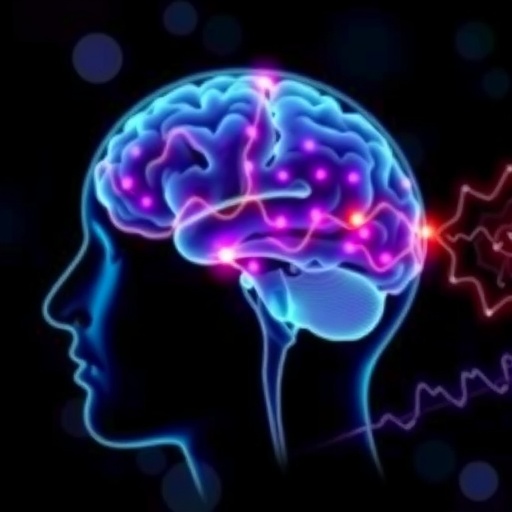Emerging research in the field of neuroscience is shedding light on the complex relationship between epilepsy and cognitive impairment, particularly when considering conditions such as mild cognitive impairment (MCI). A recent study led by Fang and colleagues, published in the Journal of Translational Medicine, explores this intricate connection through the lens of electroencephalogram (EEG) microstates, spectral analysis, and risk prediction, offering new insights into intrinsic brain activity alterations in patients facing these dual challenges.
The rise of EEG technology has enhanced researchers’ capabilities to monitor brain activity in real time, providing a window into the cerebral dynamics associated with various neurological conditions. EEG microstates, which represent stable patterns of brain activity lasting for just a fraction of a second, can be particularly revealing. They offer a unique perspective on the brain’s functional organization and have been linked to various cognitive processes.
In the context of epilepsy, these microstates can provide crucial information regarding the altered brain dynamics that accompany seizure activity. The study by Fang et al. delves into how these microstates differ in patients with epilepsy when accompanied by MCI, revealing patterns that could potentially serve as biomarkers for disease progression. The authors deployed advanced spectral analysis to quantify the frequency bands associated with different EEG microstate configurations, highlighting how these patterns deviate from established norms in healthy controls.
The implications of such deviations are significant, as they may indicate compromised cognitive functions associated with MCI, a condition that often precedes more severe neurodegenerative disorders. The research posits that by understanding how intrinsic brain activity shifts in these patient populations, clinicians may be better equipped to predict the onset of more severe cognitive decline. This predictive capability is crucial, particularly for individuals already at risk due to their epilepsy diagnosis.
Furthermore, the study reinforces the importance of considering comorbidity in neurological research. Epilepsy frequently presents alongside cognitive impairments, creating a compounding effect that exacerbates patient outcomes. By examining EEG microstates in tandem with cognitive assessments, the authors propose a more nuanced framework for approaching epilepsy management, particularly for elderly patients or those with additional risk factors for cognitive decline.
One of the key findings of the research indicates that alterations in the brain’s intrinsic activity are not just incidental; they represent fundamental changes in how the brain processes information. The authors argue that these changes can lead to a vicious cycle where epilepsy exacerbates cognitive impairment and vice versa. This interrelation underscores the necessity for integrated treatment strategies that address both seizure management and cognitive health.
Additionally, the study draws attention to the potential use of EEG microstates in personalized medicine approaches. The ability to tailor interventions based on real-time EEG assessments could lead to more effective management strategies. For example, understanding the specific microstate alterations associated with an individual’s condition could help clinicians determine optimal pharmacological treatments or therapeutic interventions.
The researchers also emphasize the need for longitudinal studies to better understand the trajectory of these brain activity changes and their implications over time. As the natural history of both epilepsy and MCI unfolds, the insights gained from these EEG analyses could illuminate how best to intervene to promote cognitive health. These findings suggest that early identification of risk through EEG monitoring may prove critical in preventing or delaying the onset of significant cognitive decline.
Moreover, the research opens up avenues for further investigation into the neurobiological underpinnings of MCI associated with epilepsy. The interactions between electrical activity and neurochemical changes in the brain, particularly in regions implicated in memory and cognition, warrant deeper exploration. Understanding these interactions could pave the way for novel therapeutic targets that might mitigate the cognitive deficits observed in patients suffering from both conditions.
The contribution of Fang et al. to the field of translational medicine extends beyond merely outlining the correlation between EEG microstates and cognitive impairment; it urges the medical community to rethink the approaches to epilepsy treatment. As the clinical implications of this research unfold, the hope is that comprehensive care strategies can emerge, ultimately improving the quality of life for those affected.
In conclusion, this breakthrough research is a testament to how advanced neuroimaging and analytical techniques can unveil the complexity of brain disorders. As neurotechnology continues to push boundaries, the integration of EEG microstate analysis into clinical practice may very well signal a new era of customized care for epilepsy patients at risk of cognitive decline. This study stands as a critical reminder of the importance of interdisciplinary approaches in understanding and managing complex health conditions.
By integrating these findings into clinical practice, both neurologists and psychiatrists can work collaboratively to ensure that patients receive holistic care that prioritizes both seizure control and cognitive health. The potential for enhanced predictive models and personalized interventions promises a brighter future for patients navigating the challenging terrain of epilepsy and its cognitive comorbidities.
Subject of Research: EEG microstates, spectral analysis, and risk prediction in epilepsy comorbid with mild cognitive impairment.
Article Title: EEG microstates, spectral analysis, and risk prediction in epilepsy comorbid with mild cognitive impairment: alteration in intrinsic brain activity.
Article References: Fang, S., Chen, S., Chen, L. et al. EEG microstates, spectral analysis, and risk prediction in epilepsy comorbid with mild cognitive impairment: alteration in intrinsic brain activity. J Transl Med 23, 1035 (2025). https://doi.org/10.1186/s12967-025-07023-y
Image Credits: AI Generated
DOI: 10.1186/s12967-025-07023-y
Keywords: EEG microstates, epilepsy, cognitive impairment, mild cognitive impairment, brain activity, risk prediction, spectral analysis.




